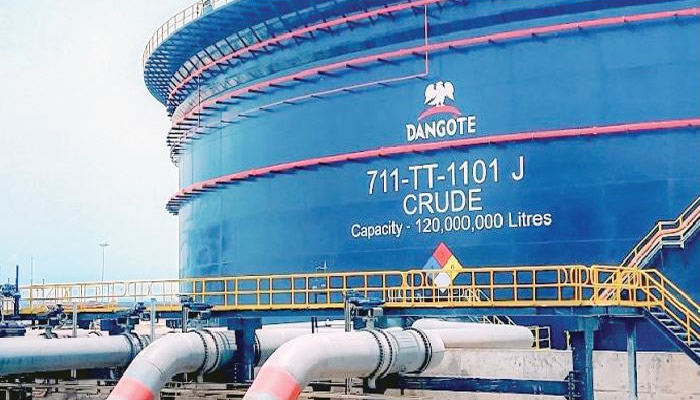The Dangote Petroleum Refinery has announced that it will no longer sell refined petroleum products to unregistered and unlicensed marketers, reinforcing its compliance with regulatory standards and commitment to transparency in the downstream sector. The move, which was confirmed by the management of the $18 billion facility, comes amid ongoing debates over product pricing, distribution challenges, and clashes with oil marketing associations.
According to the company, only marketers who have been duly accredited by the Nigerian Midstream and Downstream Petroleum Regulatory Authority (NMDPRA) and meet the industry’s regulatory requirements will continue to have access to the refinery’s supplies. The development is expected to have significant implications for market players, especially smaller, informal operators who have relied on third-party channels to access fuel.

Dangote Refinery, which recently delivered its first batch of petrol exports to international traders, has been at the centre of national attention as it ramps up operations. Management sources explained that tightening its supply chain is part of efforts to curb smuggling, ensure accountability, and stabilize fuel distribution within Nigeria. “This refinery was built to serve Nigeria first and Africa by extension. We will not allow our products to be diverted, hoarded, or abused in ways that hurt the economy,” the management stressed.
The decision comes at a sensitive time in the downstream petroleum sector. In recent weeks, the refinery has clashed with the Nigerian Union of Petroleum and Natural Gas Workers (NUPENG) over tanker drivers’ grievances and distribution bottlenecks. While NUPENG has accused the refinery of imposing unfavorable conditions on transporters, Dangote has countered by insisting that safety and regulatory compliance cannot be compromised.
Industry analysts believe this latest restriction on unregistered marketers reflects the refinery’s determination to enforce order in a sector long plagued by inefficiencies. For decades, illegal fuel trading, diversion of products, and racketeering in distribution chains have worsened Nigeria’s fuel crises. By cutting off unlicensed operators, the refinery is signaling its intent to professionalize the sector and align it with international best practices.
The impact of this policy will likely be felt most among independent marketers who have operated outside formal regulatory frameworks. While some of these operators may face short-term exclusion from supplies, experts argue that the measure could encourage more marketers to seek formal registration, thereby improving transparency in the long run.
For the government, the refinery’s stance also provides an opportunity to reinforce its broader push for reforms under the Petroleum Industry Act (PIA). The NMDPRA has already been working to sanitise the downstream environment, and Dangote’s insistence on dealing only with compliant marketers supports these efforts. The move is also expected to help check smuggling of products across borders, a persistent issue that has drained Nigeria’s economy and deprived the government of revenue.
Public reaction to the development has been divided. Some Nigerians welcome the refinery’s decision as a necessary step to protect the economy and prevent the abuse of petroleum products. Others, however, worry that excluding unregistered marketers could limit distribution channels and create temporary supply bottlenecks in certain regions.
The refinery, however, has assured that registered and compliant marketers will have adequate supply access. With the deployment of over 1,000 trucks for product distribution nationwide, Dangote has argued that legitimate operators will face no shortage. The company has also urged marketers to engage with regulators to complete their licensing processes, promising a transparent and fair allocation framework.
The refinery, described as the world’s largest single-train facility, continues to reshape the dynamics of Nigeria’s oil and gas sector. Its operations have already reduced the country’s reliance on imported refined products and positioned Nigeria as a potential hub for petroleum exports in Africa. By tightening its supply chain to exclude unregistered operators, the refinery is signaling its seriousness about building a transparent and accountable system from the ground up.
Analysts note that while there may be teething challenges, especially in regions dominated by smaller, informal marketers, the long-term benefits outweigh the costs. With Nigeria’s fuel distribution plagued for decades by leakages, corruption, and inefficiencies, a more structured and compliant system could mark the beginning of a new era.
Ultimately, Dangote Refinery’s stance is being viewed as both a warning and an opportunity. A warning to marketers that the era of informal practices is ending, and an opportunity for the downstream sector to align with global standards of efficiency, transparency, and accountability.
At a time when Nigeria is struggling to stabilise its economy, boost foreign reserves, and build investor confidence, such decisive actions by private operators like Dangote Refinery could reinforce the reforms being pushed by the government. If sustained, this new regime could restore public trust in Nigeria’s petroleum sector while ensuring that the benefits of the refinery’s operations reach citizens more equitably.
Support InfoStride News' Credible Journalism: Only credible journalism can guarantee a fair, accountable and transparent society, including democracy and government. It involves a lot of efforts and money. We need your support. Click here to Donate
